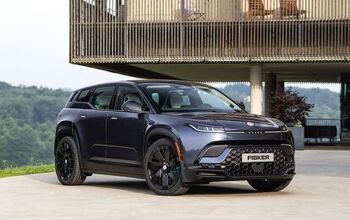Kia Takes Over The Ebay Experiment
GM was the first automaker to experiment with new-car sales on Ebay, in a grand experiment that resulted in an undisclosed number of sales (estimated at between 20 and 50 actually sold through eBay). GM’s Mark LaNeve insisted at the time that the program led to sales not logged through Ebay, but then he was booted from GM about a week after GM’s Ebay experiment fell apart. Which makes Tom Loveless, the head of Kia’s US sales operation a brave man; with only this single, discouraging precedent, Bloomberg reports that Kia is diving into Ebay sales… and unlike GM, it’s not limiting the experiment to California.
Over 300 of Kia’s 725 dealers nationwide have reportedly signed on. But it sounds like Kia is not looking for online sales so much as a heavily-trafficked online outlet for dealer listings, as Loveless simply says
This exposes our brand to a percentage of the car-buying public that perhaps wouldn’t otherwise have considered us
Which sounds like the right attitude. After all, only revolutionaries like Tesla think they can actually sell cars directly online. Still, for those among the B&B who are looking forward to the day when dealers have been done away with, this is a step back in the right direction…
More by Edward Niedermeyer

































Comments
Join the conversation
And let us remember, one more time, that various state laws make it almost impossible to "buy" the car over eBay. Shop for it? Yup. Compare with other cars? Yup. Negotiate a price and features? Yup. Figure out financing? Yup. But actually complete the transaction? Nope. At the very best you might get away with the dealer FedExing you documents to sign at home, but even that is a stretch... overwhelmingly the various regulations push you to going to the dealer to consummate the transaction. Maybe I'm just nitpicking, but I'll argue that virtually zero new cars (used, that's different) have been truly sold over the internet, in the same way that a book is sold by Amazon or a fruitcake by Harry & David. The transaction is just too complex and too heavily regulated. Maybe my hairsplitting makes no difference to the public at large (who could argue that shop/compare/negotiate/finance online is as close to a true sale as to make no difference), but since this is The TRUTH About Cars (not The MOSTLY TRUE About Cars), I gotta speak up. Otherwise I lose my grumpy curmudgeon status. PS: If anyone reading this actually has done a full online purchase of a new car (defined by me as doing it from your home or office via the internet, with the car delivered to your driveway OR, if you pick it up at the dealer, no further "consummating" paperwork signed at the dealer) I'd love to hear about it, because sooner or later someone will figure out how to do it I bet.
Typical eBay experience? Car: $6900 Shipping: $8900
I think he was kidding. Lately, ebay "auctions" (laughable term anymore) lure you in with a low price, and jack the hell out of you on shipping. That's assuming the seller isn't creating fake accounts faster than he can type to bid against his own stuff to drive the price up. It's a brave experiment, but I think Ebay is terminally broken. It's not the outlet i'd choose. Amazon maybe, but Ebay is now a etailer's bazaar, and for shifty, underhanded etailers at that.
That is excellent, re the motorcycle purchase. Maybe manufacturers and dealers can try true online buying with motorcycles, and then extend into cars. I don't know enough about the laws applying to motorcycle sales (e.g. proof of insurance forms, odometer statements, etc.) to know how far a step it is from motorcycles to cars, but this might be a good example of how it starts. My favorite quote on all this is from a judge in Texas, ruling on Ford's attempt there to remarket off-lease used cars to customers online (and, note, using dealers to deliver the cars: no disintermediation here!). The state of Texas shut it down, Ford appealed, and here is part of the ruling: "The Texas Legislature has enacted a statutory scheme that attempts to equalize the market power between manufacturers and dealers, and further the public interest of the citizens of Texas, by prohibiting manufacturers from acting in the capacity of a dealer. Thus, the plaintiff is prohibited from selling motor vehicles to consumers by mail, phone calls, leafleting, skywriting, or drum signals, as well as on a plane, on a train, in a house, or with a mouse. The Court rejects the plaintiff's argument that an activity which is appropriately regulated when accomplished through any other medium becomes sacrosanct when accomplished through the internet. If the Court were to accept the plaintiff's interpretation, then all state regulatory schemes would fall before the mighty altar of the internet. Although the internet is a mighty powerful tool, it is not so potent as to demolish every state's regulatory schemes as they apply to the sale of goods and services. ... The Code generally prohibits manufacturers from selling motor vehicles to consumers in Texas, whether those manufacturers are located in Austin or Australia.” Source: FORD MOTOR COMPANY vs. TEXAS DEPARTMENT OF TRANSPORTATION, US DISTRICT COURT OF THE WESTERN DISTRICT OF TEXAS, AUSTIN DIVISION, 106 F. Supp. 2d 905 TRANSPORTATION,US DISTRICT COURT FOR THE WESTERN DISTRICT OF TEXAS,AUSTIN DIVISION, 106 F. Supp. 2d 905